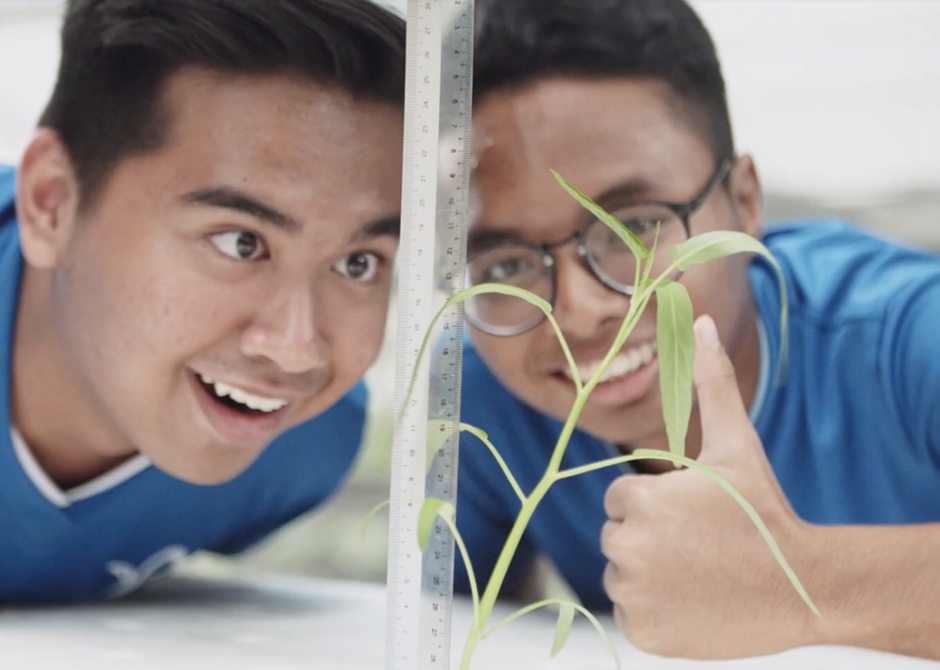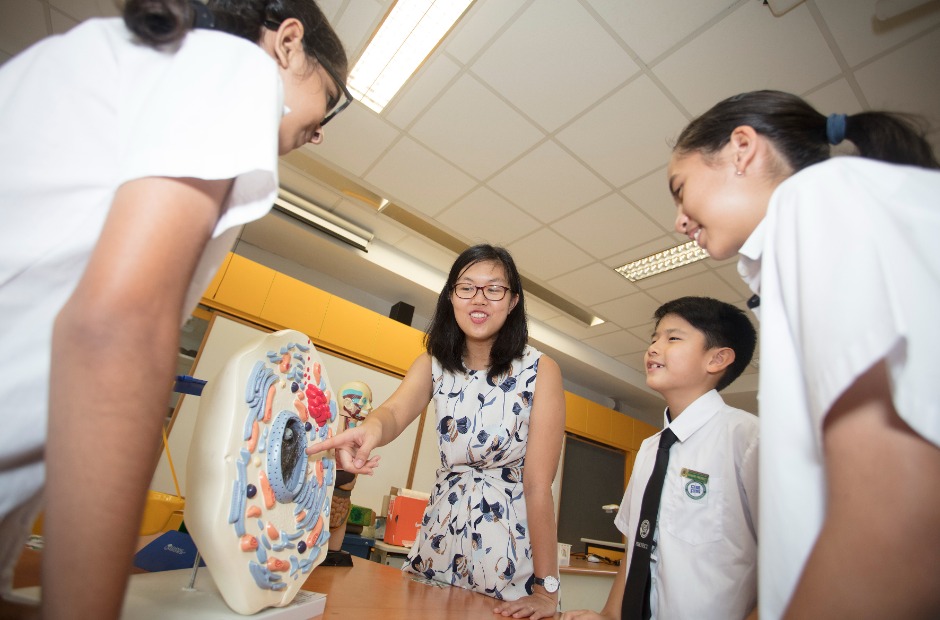“My child is growing veggies to learn Maths. What?”
There are many programmes in schools that encourage students to apply their learning to the real world, says, Mr Desmond Tan, Head of Department for Mathematics from Ping Yi Secondary School. Growing things could be used to teach a subject or even values, like resilience. Here are some ways in which you can help your child see the connections between what he learns in school and life.
1. Gamify it. Maths is hiding in various aspects of life. Start a family game where all of you try to spot the Maths in the room. For example, “How long will it take to fill this bottle with water?” or “How many different shapes can you identify in the food in your fridge?” “Which is heavier – the potato or the cauliflower?” “Which plant is growing faster – the bougainvillea or the hibiscus?” The questions are endless. Help your child see how Maths is applicable to everyday situations, and he or she will never think Maths is boring.,
2. Keep it real. Ask your child to use his/her Maths skills on your bills (electricity or water or grocery bills). Can he/she calculate and suggest good ways to save? Or, give them a budget and ask them to plan a trip. Let them calculate how far that money can go. Those are practical lessons to learn.
3. Keep it fun. There’s no need to be intimidated by Maths. The more you and your kids talk about Maths, the less scary it will seem. Share fun Math games or tidbits with them. For instance, did you know that the Fibonacci sequence is found throughout nature – in pinecones, sea shells and in trees? Do you know that bees make hexagons in their hives?

“My child loves recess playtime and talks about how there are art materials, PE equipment, musical instruments and props to play with… what can I do to help her learn in fun ways?”
Recess play is for the child to explore. As long as the environment is safe, if they use their creativity to make something new with a little noise and lots of fun, that’s great, says Mdm Siti Aishah, Subject Head of Aesthetics from Punggol Primary School. Here are some things you can do.
1. Ask open-ended questions. Open-ended questions cannot be answered with just a ‘yes’ or ‘no’. It encourages your child to explain and elaborate. Listening to your questions will also teach your child how to ask questions and have a conversation
2. Just let them talk. Ask your child about playtime. Listening to them will give you insights – who their friends are, what games they play, what they find interesting or annoying, how they handle difficulties.
3. Set up a free play area. Give your child some space at home for “free play”. They can play dress up, create stories or plan games to bring to the next school recess play session… Remember: Do not tell them how to play or how that ‘story’ should end.
4. Provide play materials. Take note that this does not necessarily mean toys. An old cardboard box, small rubber balls, colourful strings, plastic cups and bowls, sticky tape and a pair of scissors may sound like odd items to give to your child to play with but just a take a step back and watch what they will do with them. You will be surprised.
5. Create a new game. Ask your child how a game is played. For example, ask your child why a soccer game requires two goal posts. Can we have more goal posts? How do we create a new game with a change in equipment and rules? There’s no right or wrong in any decisions made. Allow them to experiment and learn on their own.
6. Throw them a challenge. If your child is a bit older, ask them how they would design playtime in school and why. This will make your child think about what works, what doesn’t. He or she will have to argue and present their case – all valuable skills.
“My child made me something… I’m not sure what it is.”
Making things has many benefits – from building confidence to creativity to resilience and problem-solving skills, says Mr Nur Haqam Abdul Latiff, Head of Department for ICT from Woodgrove Primary School. Here’s how you can help your child be a maker.
1. Encourage them to write a ‘making’ journal. Journals are not just about writing essays. Your child can document his/her creative process. For example, “My car toy – tried to make a wind-up car but the winding mechanism isn’t working out. Will try springs next week…” This will teach them about making notes (useful in so many ways). Writing things down also helps to sharpen ideas. Plus, it will be such a fun notebook to look through in the years to come… after he or she has designed their first real car or video game.
2. Look up “crafty” web sites with your child. Not only could you benefit (beaded handbags? Woven pencil cases?) but your child’s research abilities will get a boost, and they will learn a bit about judgement (“Oh, that looked easy but it took longer than I thought… next time I’ll set aside two hours instead of one…”)
3. Talk about the cost. If your child is good at making things, you could try role-playing – buying/selling their crafts with Monopoly money first, to give them the basics of personal finance. How much should that beaded bag cost? Then, when you feel they are ready, they could try their selling their ware for real. You could be raising a real entrepreneur…
“Why does my child have disgusting caterpillars?
They’re probably learning about the growth life cycle of a butterfly in Science class, says Mdm Sia Song Ling, Science teacher from Qifa Primary School. She suggests ways in which you can nurture a budding scientist…
1. Make questioning part of your child’s life. The next time your child asks you “why…” bounce it back: “What do you think is the reason? Where do you think you can find out more? What’s a reliable source of information? Do you believe the explanation? Can you test it out? How?” It’s the basis of the scientific method – asking questions.
2. Be involved. If your child is a budding scientist, work with your child to nurture the disposition of one. Together with your child, read up about science, how scientists work, how they come up with ideas. There are all sorts of articles and web sites that cater to different levels of science. Let your child direct the areas of interest and help direct him or her to the resources. Read biographies of scientists and share interesting tidbits with your child to pique their interest.
3. Do ‘Science’ stuff together. This could be cooking together, gardening, watching Science videos or visiting the Science Centre. Ask your child to think about why certain things happen in a certain way. Why does food become brown when cooked? Why are leaves green and not flowers? Why was the Science experiment in the video done in a certain way? What did it prove? You will probably not know the answers to many of the questions your child will ask. But won’t it be fun finding out together?
4. Give him/her space to dream and think. Once your child learns to ask questions and knows how to search for answers, the sky’s the limit. Maybe he/she will come up with a new way of looking at medicine that could be used to save lives. Or maybe he/she will dream up a future career that none of us can imagine right now!
“My child is really into to online games… it’s time-wasting. What should I do?”
It’s probably a phase that will pass to something else soon, but in the meantime, it’s an opportunity to bond, says Ms Adeline Chan, Head of Department for English from Deyi Secondary School.
1. Play along. Talking about the games they are playing will give you a chance to find out more about your child – how they feel about themselves, their interests, their friends, and about school.
2. Make it a family thing. Ask your child to compare the games and weigh up the pros and cons. This will hone their ability to present a case. If they’re keen enough, they could even do a dinner-time presentation on it. This gets them writing and presenting – all key skills.
3. Build on their passion. Ask them to think about how else they feel they could add to the game. Could they gain “game time” by helping out around the house? Could they create their own games? Would a coding class help?
“My child is fiddling with wires and electricity… should I stop her?”
Today, she’s fiddling with wires. Tomorrow, she may be designing smart homes, says Tan Si Hua, Science teacher from Juying Primary School. Here are some ways in which you can grow her interest.
1. Power up the conversation. If your child is studying about electrical systems, ask her how it works and how it fails. What should you check if the power suddenly goes off? Yes, the fuse. But why? What’s the role of the fuse? Ever been caught in a blackout? Share your personal stories whenever possible.
2. Help him or her see the connections. You could make it a conversation about finance by asking him/her to calculate your electrical bills and decide what cuts could be made to save money. Or it could lead to a chat about how conserving energy helps the environment.
3. Get handy. Has your child got ideas about building things to make life more convenient, such as a solar-powered fan or a new burglar alarm? Let them try it out – if they succeed, it’s one great boost; when they fail, they learn to move beyond failure; develop resilience… and perhaps new ideas.
4. Let them fiddle… safely. Learning to experiment in a safe manner is something our children need to know. Being safe is key, but we should not let our fear stop our children from learning interesting skills. Having these hands-on skills will boost their confidence. Plus, working with batteries and wiring, and testing circuitry are skills that can lead them to varied career paths. So, let them experiment in a safe manner.









.jpg)